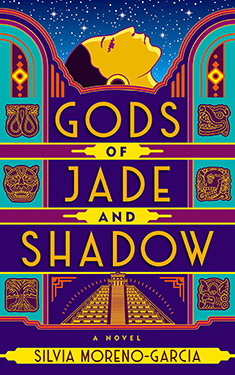Silvia Moreno-Garcia
Completed 10/1/2020, Reviewed 10/1/2020
4 stars
I believe this is the first genre
novel I’ve read by a Latinx author, perhaps the first of any type of
literature. Moreno-Garcia is
Mexican-born and Canadian “by inclination”.
This novel is Mythic Fiction, featuring Mayan gods and a lowly
Cinderella-like poor relation. It is
about the battle for the Kingdom of the Underworld between twin brother
gods. It is both light and heavy, with powerful
themes of love and self-sacrifice, while sprinkled with a little humor. I really enjoyed the novel, particularly the
exposure to the Mayan mythology, of which I know very little. And I’m always up for a good fantasy based on
mythology. This book was nominated for
several awards including the Nebula.
Casiopea is a wonderful character, named after the constellation by her poet father of Mayan ancestry. Being her father’s daughter, she is dark-skinned, unlike the rest of her family who are lighter-skinned people of European descent. The resulting bigotry is what keeps her and her mother oppressed by their own family. Casiopea keeps to her station, as commanded by her mother, but she does so with dissent and bitterness in her eyes, often arguing, garnering the wrath of Martin, her grandfather, and her aunts. She is smart, educated, and strong-willed, unlike many of the women of the village. Then on the journey across Mexico, she brings a freshness and a humanness to Hun-Kame.
What brings Hun-Kame to life is the blood of Casiopea, as it is absorbed by his bone shard lodged in her hand. It also siphons some of her humanity and personality into him as well. Ultimately, though, this will kill her unless he can retake the throne and remove it from her. But if he wants to live, it must remain in her hand, endangering her life. Hun-Kame is a well-developed character, starting off disaffected and becoming softened by Casiopea’s physical and emotional connection to him. Vucub-Kame, on the other hand, is hardened and harsh, like Martin. The contrasts are awesome, and the coming together of the characters and the personalities is well played.
I really liked Moreno-Garcia’s prose. She writes vivid depictions of people, places, and actions without being overbearing, but still maintaining a mythic quality. The dialogue is crisp. There is some exposition as Hun-Kame relates the story of his divinity and the conflict with his brother when asked by Casiopea, but it is written well, told over a several sittings, and is very interesting.
I give this book four stars out of
five. It was very nearly a five-star rating. I could empathize with Casiopea and Hun-Kame,
but never quite had the emotional response for which I usually reward the higher
rating. Still, I enjoyed it very
much. It is a quick read, with the
travelogue and the exposition never being boring. The final confrontation between the two
brothers, the form of which I won’t give away, was dramatic and riveting. There are a lot of stories out there
featuring Norse, Egyptian, Hindu, and African mythologies, but this is first I’ve
come across with Mayan. I highly
recommend this book if you’re looking for something with a different flavor
than the majority of mythological fiction out there.

No comments:
Post a Comment